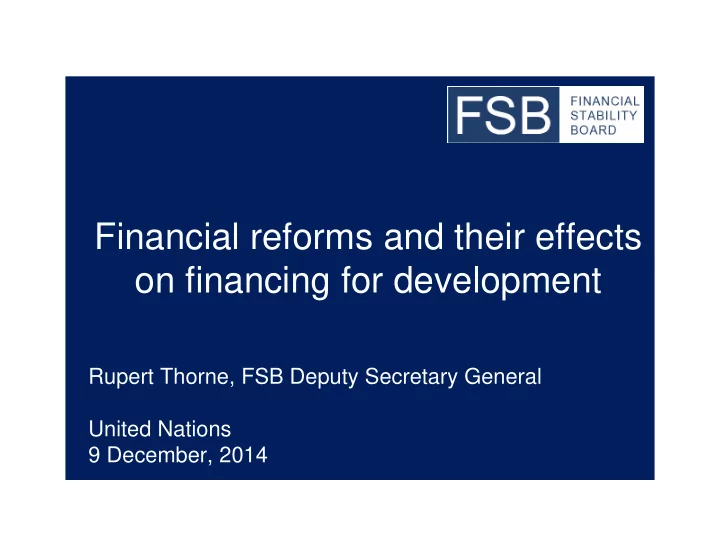

Financial reforms and their effects on financing for development Rupert Thorne, FSB Deputy Secretary General United Nations 9 December, 2014
State of play on financial reforms G20 Leaders in 2009 committed to fundamental reform of the global financial system Objectives – fix the fault lines that led to the crisis, and build safer finance to serve better the real economy The job to agree international measures to fix the crisis is substantially complete Next phase of financial reform – address new and constantly changing risks, and promote a system based on mutual trust and cooperation 2
Priority post-crisis reforms Making banks more resilient Ending too-big-to-fail Transforming shadow banking into resilient market-based financing Making derivatives markets safer 3
Making banks more resilient Basel III substantially raising quantity and quality of capital A key goal – more consistent provision of finance through the cycle New rules are rebalancing balance sheets towards traditional banking and away from trading Bankers’ compensation standards to better align pay incentives with long-term risks 4
Ending too-big-to-fail Goal: Failures of even the largest financial firms do not cause cost to public or economic disruption Ending too-big-to-fail will level the playing field between the largest financial institutions and the rest of system Pillar 1: Legal and operational changes – FSB Key Attributes of Effective Resolution Regimes Pillar 2: Higher capital and truly loss-absorbing debt for systemically important financial institutions (SIFIs) Pillar 3: More intensive and effective supervision for SIFIs to reflect additional complexity and systemic risks 5
Transforming shadow banking Filling regulatory gaps as regulations are tightened for banks Address bank-like systemic risk – borrowing short to lend long, and leverage November: FSB updated comprehensive policy package and roadmap Goal: to transform shadow banking into resilient source of market-based finance for the real economy – including infrastructure and SMEs 6
Making derivatives markets safer Previously lightly regulated over-the-counter derivatives market Greater transparency through trading and reporting requirements Central counterparties to reduce risks Minimum capital and margining Ensure consistent cross-border application of rules – conflicts between rules fragment markets and reduce finance 7
Next phase – implementation and cooperation • FSB comprehensive monitoring and peer review of reforms • From 2015, streamline through annual report on implementation and its effects • Monitor for new and evolving risks, with common responses where appropriate • Building mutual trust – Sharing data and information – consistent implementation of agreed common standards – Taking account of each jurisdiction’s circumstances – Deferring to each other’s rules where outcomes are equivalent 8
Working with EMDEs • FSB engaging with wide range of EMDEs – 10 of 24 FSB member countries are EMDEs – 6 Regional Consultative Groups, outreach to additional 70 jurisdictions – In 2014, review of FSB representation has strengthened voice of EMDEs • EMDEs that are FSB members have made most progress in adopting international regulatory reforms • Other EMDEs with less developed financial systems are adopting a more phased approach • Lack of resources and expertise to adequately respond to post-crisis regulatory initiatives 9
Understanding effects on EMDEs • 4 FSB reports on financial stability and EMDEs since 2011, informed by EMDEs both inside and beyond the FSB • Still early stage of implementation – to date EMDEs haven’t reported major unintended consequences from reforms • Concerns about potential unintended consequences: – Basel III, policy measures for G-SIFIs, OTC derivatives reforms, national structural banking initiatives – Need for cross-border coordination & information sharing • FSB and standard-setters working on more inclusive policy development processes and further implementation support 10
Monitoring effects on infrastructure and SME finance • FSB monitoring as part of wider G20 study: – Identify potential unintended consequences arising from international financial reforms • Initial report February 2013, update Sept 2014 • Most important contribution of financial regulation to long- term investment finance: – to promote a sound and resilient financial system. – This will support planning over long-term horizon • Regulatory framework needs to support increasing role of institutional investors – e.g. simple and transparent securitisations 11
Recommend
More recommend